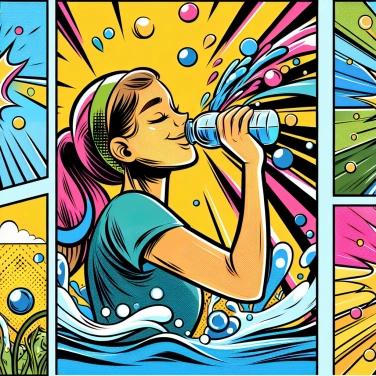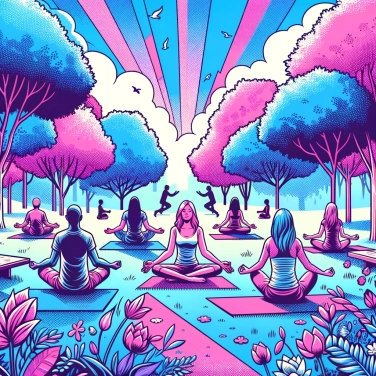Drinking water is essential as it makes up about 60% of our body, participating in regulating body temperature, transporting nutrients, and eliminating waste. Dehydration can lead to health problems such as kidney disorders and a decrease in cognitive abilities.

The body is like a giant chemical factory, and water is its main ingredient. Basically, we are made up of over 60% water, so it definitely matters. Water regulates your body temperature through sweating and helps eliminate waste through urine and sweat. It is also thanks to it that nutrients, hormones, and oxygen circulate properly in your body. Without a regular dose of water, even your brain slows down, as water allows it to maintain its chemical and electrical balance. The same goes for your joints, your eyes, and your internal organs; they all need you to stay well-hydrated to function normally.
Water directly participates in the transformation of food into energy, facilitating digestion and absorption, and making it possible for waste to be eliminated by the kidneys. It also improves blood circulation, providing better distribution of nutrients and oxygen to the muscles and organs. Drinking enough water also helps regulate body temperature through sweating, which is essential during exertion or exposure to heat. Finally, water acts as a valuable natural lubricant for our joints and helps keep our skin supple and hydrated.
Drinking enough water is essential to keep your muscles fit and full of energy. Good hydration allows your body to better regulate its temperature during physical activity by releasing heat through sweating. As soon as you lack a little water, fatigue sets in faster, physical endurance decreases, and your sports performance quickly declines. Joints also need water: it helps to lubricate and protect cartilage, so less water means a higher risk of injury and less ease in your movements. In short, to stay dynamic, flexible, and effective on the field or at the gym, it’s best to keep a bottle within reach.
The brain works like a real sponge: if it doesn't have enough water, it quickly starts to malfunction. Proper hydration improves thinking speed, attention, and memory capacity. Conversely, even a slight decrease in hydration is enough to cause concentration difficulties and a feeling of mental fog. A glass of water at the right time immediately helps boost your mental sharpness and allows you to be more responsive. This shows that the miracle cure for better thinking is often simply found at the tap.
One of the first signs of dehydration is simply the feeling of thirst. If you wait until you are really thirsty, you are probably already dehydrated. Other signs that should alert you include: dry mouth, dark urine, unusual fatigue, minor energy dips, and sometimes even a slight headache that begins to emerge. When you don't drink enough, your brain functions less efficiently, and you easily risk dizziness or unexpected drops in energy. To avoid these minor inconveniences, the idea is to drink very regularly, even without explicitly feeling thirsty. Keeping a small water bottle or a glass of water within reach is generally a simple and effective strategy to stay properly hydrated throughout the day.
Some water-rich foods like cucumbers, watermelons, and tomatoes can contribute to your daily hydration. So, consider incorporating these foods into your diet in addition to your regular water intake!
Drinking water regularly could significantly reduce the risk of urinary infections by promoting bacterial elimination and improving kidney function.
Contrary to popular belief, you should not wait until you are thirsty to drink. The sensation of thirst occurs when our body begins to experience slight dehydration.
Often confused with the feeling of hunger, some cravings may actually be an early signal of mild dehydration. Drinking a glass of water before eating can help you better identify your true nutritional needs.
In children and the elderly, common signs of dehydration include a decrease in energy, dry skin, mood changes, confusion, or dry lips. It is important to regularly monitor their hydration and encourage them to drink frequently.
Certainly! Drinking a glass of water upon waking helps the body to restart, while a glass of water before meals aids digestion. It is also recommended to drink during and after physical exertion or when feeling tired or experiencing a loss of concentration.
A simple way is to observe the color of your urine. Clear or slightly yellow urine usually indicates good hydration. If the urine is dark, it may be a sign that you need to drink more water.
Even though it remains rare, drinking extremely large amounts of water in a short period of time can lead to hyponatremia, a dangerous dilution of the body's minerals. It is therefore advisable to adjust one's water intake to real needs by drinking regularly and moderately.
Certainly! Here’s the translation: "Indeed, other beverages like tea, herbal infusions, or flavored water can contribute to hydration. However, pure water remains the best option for effective hydration as it contains neither calories nor additives."
The recommended amount of water varies according to age, physical activity, and the environment. Generally, it is advised to drink about 1.5 to 2 liters of water per day for an average adult to maintain good hydration.

No one has answered this quiz yet, be the first!' :-)
Question 1/7